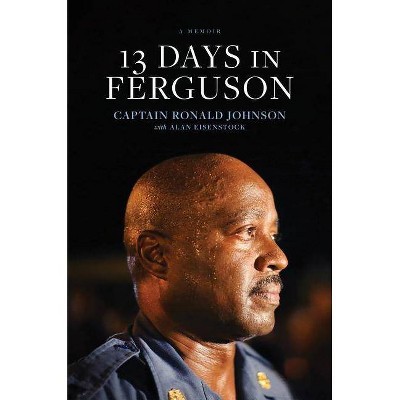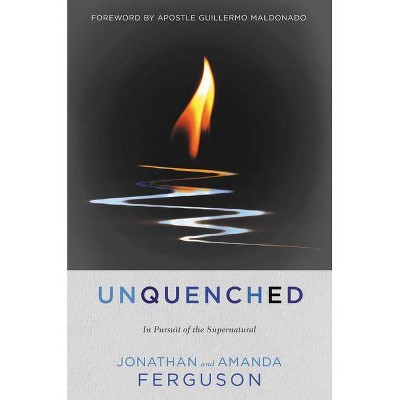George MacKay Brown - by Ron Ferguson (Paperback)

Similar Products
Products of same category from the store
AllProduct info
<p/><br></br><p><b> About the Book </b></p></br></br>George Mackay Brown is one of the 20th century's finest writers. This biography sweeps us along on an enriching literary and spiritual journey..Draws on unpublished letters, conversations with the enigmatic Bard's friends and well-known writers. Shortlisted for the Saltire Award Best Research Book of the Year.<p/><br></br><p><b> Book Synopsis </b></p></br></br>Enigmatic - mysterious - intriguing: George Mackay Brown was a notoriously private man. He rarely left his native Orkney, and yet became one of the 20th century's finest poets and prose stylists. In his prolific writings, George Mackay Brown's spirituality and his love of the wind-scoured island landscape fused to give us some of the most beautiful poetry and prose in the English language. His work is shot through with glimpses of the divine. Ron Ferguson, who was described by George Mackay Brown as 'a true craftsman in litereature' tracks with curiosity and passion his friend's literary and spiritual journey, including his controversial move from Presbyterianism to Roman Catholicism. He explores the darker, more tormented, side of Orkney's Bard and uncovers the intense relationship between alcohol, suffering and creativity. This is a riveting journey. Along the way, the author is forced to question some of his own assumputions. And the reader is swept along on a literary and spiritual voyage of discovery that compels to the very end. Weaving a brilliant, enriching narrative, the author draws extensively on the poet's writings, unpublished letters, conversations with the Bard's friends and many well-known writers. SHORTLISTED FOR THE SALTIRE AWARD FOR BEST RESEARCH BOOK OF THE YEAR<p/><br></br><p><b> Review Quotes </b></p></br></br><br>'This book is a new Orkney Tapestry. The life and work of GMB are stitched intricately into the islands with deftness and delicacy. It is also crafted with great humility. Despite the personal approach, Ron Ferguson never gets in the way of the telling but lets the tale and the tellers (especially teh main teller) have their say. A line came into my mind, from RLS Bright is the ring of words when the right man rings them. I often through this applied to George more than any other Scottish writer. But it also applies to the author of this revealing and riveting biography. Quite simply, I came out of this book more human than when I went in, more spiritual (dare I say it) and somehow happier!.'--Christopher Rush, poet and novelist<br><br>'This revalatory account of George Mackay Brown's spiritual journey is wonderfully wise and humane, often unsettling, even distressing, but always affirmative. It illuminates the turmoil and yearning within him, and his tortuous relationship with his ministering angels and with Orkney. With its rich patterning of extracts from his prose and poetry and from intimate letters, it promises a deeply rewarding experience.'--Stewart Conn, poet, Edinburgh's first Makar<br><br>Take a close look at the front cover. The fine portrait of George Mackay Brown (GMB) lacks the boyish grace and shy twinkling eyes we associate with Orkney's prolific poet, novelist and short story writer. Instead we see a face suffused with reflective suffering, a figure who has lived long with sorrow. This striking image sets the direction of travel for Ron Ferguson's critical but affectionate biography of one of Scotland's best writers in the second half of the 20th century. Maggie Ferguson's award-winning account of GMB began the task of demythologising the life of this elusive character, who was only partially understood by many who thought they knew him well. Ron Ferguson carries it further and in a different direction: he tracks GMB's journey from Presbyterianism to Catholicism, reflecting on the consequences of this for his life and art. In parallel he explores the spirituality - the search for meaning in human lives - of these two Christian faiths which have dominated Scottish society throughout our history as a nation. Ferguson is well suited to this task: he is a gifted journalist, the author of many books, including fiction, drama and biography, and - not least - was the charismatic minister of St Magnus Cathedral in Kirkwall. His back catalogue of postings include Easterhouse in Glasgow and leader of the ecumenical and radical Iona Community. Ferguson reveals GMB to be a complex character, a conscious wearer of defensive masks: gentle and charming, but at times vicious and hurtful. In the midst of crushing depressions - often fuelled by drink - his salvation is to pick up the cheap Biro and keep on writing. He emerges as a selfish man, emotionally needy and ardent for female love and affection. He finds a reciprocated attraction in women of all ages but is unable to take responsibility for these relationships and absents himself if threatened. Ferguson has tracked down new letters between GMB and Stella Cartwright that make poignant reading: two vulnerable and sensitive people, both lost in alcohol, seeking and giving solace to one another. We hear a strikingly direct, emotional voice from the poet with the nuanced and crafted mask of the skald removed. This biographer has cast his net wide, dealing perceptively and persuasively with all aspects of his subject's life and art. In doing so, he has recruited the views and opinions of many writers, friends of the poet, artists and thinkers from Orkney and Scotland, who reflect upon GMB, religion and art, and their place in Scottish life. This results in an authoritative and exhaustive account of his subject. If Ferguson is at times over-generous in allowing others to discourse on GMB, it is more than compensated by his own observations that carry their weight lightly in an informal, inclusive style. For example, while GMB and his spiritual mentor Edwin Muir are deeply critical of Calvinism, Ferguson mounts a spirited defence of John Knox as a progressive, well-rounded thinker, dismissing the ahistorical and ill-informed views that have characterised him as a morose Scottish Orangeman. This book deepens our understanding of Scottish literature today and illuminates the life and work of one of its central figures.<br> -- TES<br><br>'A brilliant evocation of George Mackay Brown, his spiritual journey, his dark nights of the soul, his art, his relationships. This is a book shot through with remarkable insight, humour and pathos, underpinned by a deep, life-affirming humanity.'--Alison Miller, novelist and short-story writer<br><br>'For those who thought they had the measure of George Mackay Brown, this fascinating and compelling book shows we have not higherto grasped his full complexity.'--Alec Webster, Prefessor Emeritus, Universtiy of Bristol<br><br>'Here is an enthralling search for the well-springs of George Mackay Brown's genius. Ron Ferguson's enquiries reveal the poet of beauty, pain and loss as unique yet universal. But Ron Ferguson gives us more than simply an insight into a great poet. This book engages profoundly with the place of tradition in contemporary culture, and with the role of religious and Christiian, ceremony in illuminating life's mystery. A book to cherish.'--Very Reverend John Miller<br><br>'In revealing the inner life of a poet whose work was a form of personal salvation as well as a createive expression of faith, Ron Ferguson has given us a portrait of George Mackay Brown which is not only brave in its candour but profound in its insights.'--Kenneth Roy, Editor, Scottish Review<br><br>'Ron Ferguson has written an extraordinary account of two spiritual jouneys, his own and that of the wonderful poet George Mackay Brown, which interweave with the moving pathos of a Beethoven violin sonata, against the haunting background of the magic of Orkney. This is a courageous and honest book which confronts some of the deepest dilemmas of faith and vocation - priestly and poetic. Beautifully written, Ferguson's highly original story reveals the unique impulses of imagination and character that shape and individual's spiritual story.'--John Cornwell, author and commentator<br><br>'The spiritual journey of any person should be a very intimate account of their journey towards their Maker. I found this book fascinating reading, giving insight into George Mackay Brown's spiritual journey. At times, it was as if I was looking into someone else's soul - and making sense of all I have known about them, while not yet fully understanding my own soul! I am sure many will be encouraged to think more about themseleves and our present world situation, rather than about George Mackay Brown, after reading this enthralling book.'--Cardinal Keith Patrick O'Brien<br><br>'This is a remarkable, compelling and I think rather profound book, examining George Mackay Brown's life and art throught he unifying lens of his spiritual beliefs. This approach makes for a fresh and moving study of a great writer and struggling man, This is as absorbing and inspiring a study of an artist's life and work as I have read. It is for anyone who believes the examined life is worth living.'--Andrew Greig, poet and novelist<br><br>'This is at once a vigorous biography of a great poet and a rich celebration of Orkney life. At its heart is a challenging, gut-gripping account of a controversial religious conversion. It's a sympathetic yet clear-sighted book; Ron Ferguson does not shrink from the occasional need to visit some dark places.'--Dr Harry Reid, author, former Editor of The Glasgow Herald<br><br>'This is not just a voyage around George Mackay Brown, it is a sincere and honest journey into the inner workings of the writer's heart and mind.'--Kenneth Steven, poet and short story writer<br><br>In this fascinating book Ron Ferguson takes us inside George Mackay Brown's rag and bone shop. Ferguson clearly loves and admires Brown, so there is nothing voyeruistic about his research, no great revelation about a newly discovered weakness. And the known wealknesses are dealt with sympathetically. The alcoholism. The sexual anxiety. The sponging off the good will of others. The fussy, puritanical bowdlerising of his own early poetry. The idealisation of the past and the hatred of the present. Yet it is from this unpromising material that Brown made his art.'--Richard Holloway, author and broadcaster<br>
Price History
Price Archive shows prices from various stores, lets you see history and find the cheapest. There is no actual sale on the website. For all support, inquiry and suggestion messages communication@pricearchive.us




















